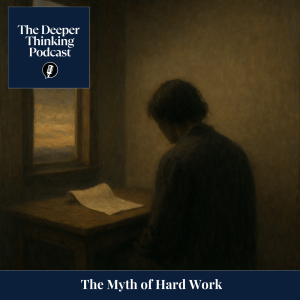
Sunday Feb 09, 2025
🎙️ The Myth of Hard Work – The Deeper Thinking Podcast
The Myth of Hard Work: Exhaustion, Identity, and the Invention of Effort
For anyone questioning the virtue of hustle, the fatigue of modern identity, and the systems that reward burnout as loyalty.
What if hard work is not the engine of success, but the architecture of control? In this episode, we peel back the mythology surrounding effort to uncover the deeper histories and ideologies that have shaped our cultural obsession with productivity. This is not a how-to guide for working smarter—it’s a philosophical excavation into why we believe work is sacred, and what it costs us to keep believing.
Drawing on Max Weber’s The Protestant Ethic, Michel Foucault’s concept of self-surveillance, and Hannah Arendt’s critique of modern labor, we confront a system that moralizes exhaustion and confuses effort with virtue. With insight from Daniel Kahneman’s work on cognitive bias, we explore how our minds mismeasure value—and how capitalism exploits that distortion.
This isn’t just a critique of hustle culture. It’s a meditation on the quiet radicalism of opting out, of reclaiming rest, and of separating worth from output.
Reflections
- Effort has become a performance of belonging. But who benefits when we’re too tired to question?
- Exhaustion isn’t a side-effect of success—it’s often its currency.
- The hardest workers aren’t always the most rewarded. Sometimes they’re just the most conditioned.
- True rest threatens systems that rely on compliance through fatigue.
- The pressure to be productive is a form of quiet violence masked as moral good.
- What we call "work ethic" may be centuries of guilt dressed up as aspiration.
- Our obsession with effort blinds us to what’s actually effective.
- To step back isn’t laziness—it’s lucidity.
- And maybe, the most revolutionary act is to stop proving we deserve to exist.
Why Listen?
- Challenge the myth that effort equals value
- Explore how work has been moralized as a form of identity and control
- Learn how thinkers like Weber, Arendt, Foucault, and Kahneman interrogate the structures behind labor
- Reimagine rest as ethical resistance
Listen On:
Support This Work
If this episode helped you rethink the value of your time and effort, you can support the show here: Buy Me a Coffee. Your contribution helps us keep asking harder questions.
Bibliography
- Weber, Max. The Protestant Ethic and the Spirit of Capitalism. Dover Publications, 2003.
- Foucault, Michel. Discipline and Punish. Vintage Books, 1995.
- Arendt, Hannah. The Human Condition. University of Chicago Press, 1998.
- Kahneman, Daniel. Thinking, Fast and Slow. Farrar, Straus and Giroux, 2011.
- Han, Byung-Chul. The Burnout Society. Stanford University Press, 2015.
Bibliography Relevance
- Max Weber: Exposes the moral underpinnings of capitalist labor rooted in religious tradition.
- Michel Foucault: Reveals how internalized discipline turns workers into their own managers.
- Hannah Arendt: Critiques the transformation of human identity into labor identity.
- Daniel Kahneman: Demonstrates how mental effort is misjudged and exploited in economic behavior.
- Byung-Chul Han: Offers a powerful critique of the burnout condition as a systemic pathology.
Sometimes, the hardest thing to do is nothing. And that’s exactly why it’s so powerful.
#HardWorkMyth #MaxWeber #MichelFoucault #HannahArendt #DanielKahneman #ByungChulHan #Burnout #Productivity #Capitalism #TheDeeperThinkingPodcast #Effort #RestIsResistance #CognitiveBias
No comments yet. Be the first to say something!